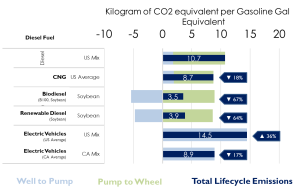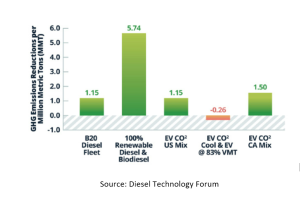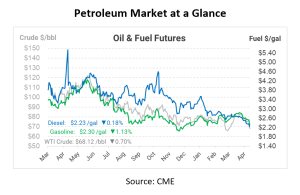
Biofuels: The Surprise Winner for Reducing Fleet Emissions
As fleets pursue sustainability, there’s a lot of hype surrounding electric vehicles (EVs). But did you know there’s a simpler and easier way to hit your sustainability goals – and you can do it right now? For heavy-duty and medium-duty fleets, biofuels may be the surprise environmental winners.
For years, EVs have been celebrated for their potential to reduce greenhouse gas emissions (GHG) in a new era of sustainable transportation. However, the research shows that biofuels could be an even greener solution.
A few years ago, the EPA commissioned Argonne Labs, one of the country’s premier research facilities, to evaluate the difference in emissions across different energy products and in different applications. That research found that for HD/MD fleets, every gallon of diesel emits the equivalent of 10.7 kg of CO2 (the study looked at all GHGs and converted it into a CO2 equivalency). Biodiesel and renewable diesel slightly lower tailpipe emissions, but their total lifecycle emissions were much lower since their feedstocks, soybeans, and other crops, remove carbon from the air before being burned. EVs of course have zero tailpipe emissions, but in most of the US, they produce more GHGs total than diesel fuel since America’s power generation comes largely from natural gas and coal.

According to The Diesel Technology Forum, by 2032, 100% renewable diesel and biodiesel will offer three times more significant GHG emissions reductions than electric vehicles. Why? The surprise outcome is due to the slow transition towards new electric vehicles, limited availability of charging stations, and the fact that a significant portion of electric power still comes from fossil fuels instead of renewable sources. In contrast, biofuels can be readily incorporated into the entire diesel fleet at any time, making them a more flexible option for reducing emissions.

Biofuels
Biofuels are created from organic matter and can be used to power internal combustion engines in a similar manner to traditional fossil fuels. The most common types of biofuels are ethanol (typically derived from corn or sugar cane) and biodiesel (made from vegetable oils or animal fats).

Biofuels have a significant advantage as they have the potential to be carbon neutral. When biofuels are burned, any carbon dioxide released is counteracted by the carbon dioxide that the plants absorb during the photosynthesis process. This can help reduce overall greenhouse gas emissions. Additionally, biofuels can be mixed with traditional fuels, making it easier for countries to transition away from fossil fuels.
According to the Environmental Protection Agency (EPA), biodiesel can be dispensed as 100% or as a blend with petroleum diesel. Common blends include B5 and B20. Biodiesel concentrations of up to 5% (B5) are approved for safe operation in any diesel engine, including passenger cars and trucks and heavy-duty trucks. B20 blends are approved in nearly all engines without voiding engine warranties.
Renewable Fuel Solutions
Are you searching for the right biofuel blend to meet your sustainability goals? Look no further! Mansfield provides customers with a wide range of biofuel blends — from biodiesel and renewable diesel to ethanol — to meet all your needs.
Contact the clean energy experts at Mansfield today to learn how to take the guesswork out of your sustainability goals.

This article is part of Daily Market News & Insights
Tagged:
MARKET CONDITION REPORT - DISCLAIMER
The information contained herein is derived from sources believed to be reliable; however, this information is not guaranteed as to its accuracy or completeness. Furthermore, no responsibility is assumed for use of this material and no express or implied warranties or guarantees are made. This material and any view or comment expressed herein are provided for informational purposes only and should not be construed in any way as an inducement or recommendation to buy or sell products, commodity futures or options contracts.





